In a recent judgment of Geeta Dubey & Others v/s United India Insurance Co. Ltd. & Others, the Supreme Court of India set aside the High Court’s decision to overturn the award granted by the First Additional Motor Accident Claims Tribunal (MACT) in a motor vehicle accident case. This case involved the tragic death of Chakradhar Dubey, who succumbed to injuries after a truck collided with the car in which he was traveling. The High Court had earlier ruled in favor of the insurance company, rejecting the MACT's finding that the accident involved the truck bearing registration number MP-19-HA-1197. The apex court, however, reinstated the MACT's award, citing several lapses in the High Court's reasoning and misapplication of legal principles.
The Incident and Initial Investigation:
On June 18, 2018, Chakradhar Dubey, an Assistant Post Master in Maihar, was traveling home in a car (MP-19-CB-5879) driven by his friend, Narayan Das Tiwari. The car was hit by a truck (MP-19-HA-1197) driven recklessly by the second respondent. The collision resulted in Dubey sustaining severe injuries, leading to his eventual death on June 28, 2018, despite being treated at multiple hospitals. The FIR lodged on June 21, 2018, identified the accident as involving an unknown truck, though no registration number was provided at the time.
Following the FIR, further investigation, prompted by information from witnesses, led to the charge sheet being filed, implicating the truck bearing the number MP-19-HA-1197. The police investigation, which had initially been closed, was reopened following a petition by Dubey’s widow, who informed the authorities about witnesses to the accident. The charge sheet later confirmed that the truck was indeed involved, and its driver was charged with several offences under the Indian Penal Code.
MACT’s Ruling:
The claimants, represented by Dubey’s widow and son, filed a petition seeking compensation under the Motor Vehicles Act. The MACT, after considering the available evidence, awarded compensation amounting to Rs. 50.41 lakh. Key to this decision was the testimony of eyewitnesses, including Sonu Shukla, who confirmed the truck’s involvement in the accident. Despite the insurance company’s claim of contributory negligence on the part of the car's driver, the tribunal found that the claimants had sufficiently proven that the accident was caused by the negligent driving of the truck driver. The MACT also noted that the insurance company had not presented any evidence to support its allegations of collusion.
The High Court’s Overturning of the Award:
However, the High Court of Madhya Pradesh, in a brief order, overturned the MACT's ruling. The High Court's primary argument was the absence of direct evidence, such as the truck's registration number being provided immediately after the accident, to establish its involvement. The High Court criticized the delay in pursuing the case and the lack of investigation into possible CCTV footage, suggesting that the MACT had acted out of misplaced sympathy rather than based on sound legal principles.
This decision did not consider the complete body of evidence presented before the MACT, including the charge sheet, eyewitness testimony, and the police’s investigation. The High Court’s decision was criticized for its lack of detailed examination of the facts and law involved in the case.
The Supreme Court’s Intervention:
The Supreme Court found the High Court’s order unsustainable for several reasons. First, it emphasized that in motor accident claims, the claimant is required only to prove the involvement of the vehicle in question on a preponderance of probability, not beyond a reasonable doubt. The Court cited previous rulings, including Bimla Devi & Ors. vs. Himachal Road Transport Corporation (2009), to underline that the standard of proof in such cases is lower, and the claimants were not required to provide absolute proof.
Second, the Court found that the claimants had discharged their burden of proving that the truck MP-19-HA-1197 was involved in the accident. The FIR, witness statements, and police charge sheet all corroborated the claim. Eyewitness Sonu Shukla’s deposition was also vital, though there was some delay in recording his statement. However, this delay was adequately explained by the claimants, who had been preoccupied with the deceased’s treatment and funeral rites.
The Court also noted that the insurance company, which had raised the possibility of collusion, had failed to substantiate this claim. The company had not presented any evidence to suggest that the truck’s involvement was fabricated, nor had it filed any complaints to investigate the issue further. This failure to produce evidence against the claimants or the police’s investigation weakened the insurance company’s case.
Age of the Deceased and Multiplier Issue:
Another issue raised by the insurance company concerned the age of the deceased, arguing that the multiplier applied by the MACT was incorrect. The insurance company claimed that the deceased was 58 years old at the time of the accident, whereas the claimants asserted that he was 55, as per his postmortem report. The Supreme Court, finding no evidence to support the insurance company's claim regarding the age, upheld the MACT’s application of the multiplier based on the deceased's age of 55.
Conclusion:
In conclusion, the Supreme Court restored the MACT’s award, finding that the claimants had sufficiently established the involvement of the truck MP-19-HA-1197 in the accident and had discharged their burden of proof. The High Court’s decision to set aside the award was deemed erroneous, as it failed to properly appreciate the evidence and applied an unnecessarily strict standard of proof. By overturning the High Court's order, the Supreme Court reinforced the principle that in motor accident claims, the focus should be on whether the claimant has established their case on a preponderance of probability, not beyond reasonable doubt.
The decision also highlights the importance of detailed and careful consideration of all evidence in appeals under Section 173 of the Motor Vehicles Act. The Supreme Court’s judgment ensures that justice is delivered to the victims of road accidents and their families, who rely on the timely and fair resolution of their claims.
Section 173, Motor Vehicles Act - 1988
Motor Vehicles Act, 1988

